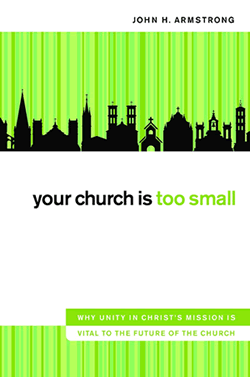Review: Your Church is Too Small


I grew up hearing about the dangers of ecumenism. It seems that ecumenism meant compromise, and compromise quickly led to abandonment of the gospel.
I’ve wrestled with this issue many times since my childhood, in my relationship with other community churches, individuals, and with the doctrinal and ethical issues that arise. I’ve enjoyed my relationship with Christians from other streams, learning from them without abandoning the distinctiveness of my stream. But how far is too far? How can we pursue unity without compromising doctrine?
In Your Church is Too Small, John H. Armstrong argues for a unity that crosses social, cultural, racial, and denominational lines. It’s not denominational or organizational unity, and it’s not a unity that abandons truth in order to build consensus. Instead, it’s a relational unity based on the Great Tradition of the church – “the core, elemental truths that are essential to historical and confessional Christianity.” A good place to start, he suggests, is the Apostles’ Creed. Armstrong argues for what he calls missional-ecumenism, because he believes that we must be shaped by a God who desires unity and who has called us to participate in his mission to a world that does not know the gospel.
Armstrong comes from the Reformed tradition. He knows that many people are going to question his approach. It’s one thing to display unity with others from similar traditions, but where do we start with the Catholic and Orthodox streams? Armstrong suggests that we begin relationally and interpersonally, through prayer and conversation. It will require “unusual grace and profound sacrifice.” It will avoid twin errors of emphasizing unity at the expense of doctrine, and minimizing doctrine at the expense of unity. In short, it will take a miracle – but it’s worth pursuing.
Armstrong lists those who have taught him about this unity, including Lesslie Newbigin, John Stott, and J.I. Packer. Packer wrote the foreword. Packer and Stott illustrate the challenge of taking up this vision. Stott and Martyn Lloyd-Jones famously quarreled over whether or not it was right to stay within the Anglican union. Packer is part of a church in Vancouver that has been wrestling with its relationship to the Anglican Church of Canada. The obstacles to unity are too many to count.
But Armstrong’s book is an important one. The issue of unity is too important to address, unless we choose to ignore key passages of Scripture. We may not be able to solve all the problems, but Armstrong does two things really well. One: he makes unity an issue. Two: he gives some solid advice for how individuals can pursue unity at the individual and local level. I highly recommend that you get this book and wrestle with the issues he raises. It’s too important an issue to be ignored.
A blog tour is taking place this week. Koinonia has a list of the blogs taking part in the tour.
More at Amazon.com | YourChurchIsTooSmall.com | Zondervan.com
This book was provided for review by Zondervan






